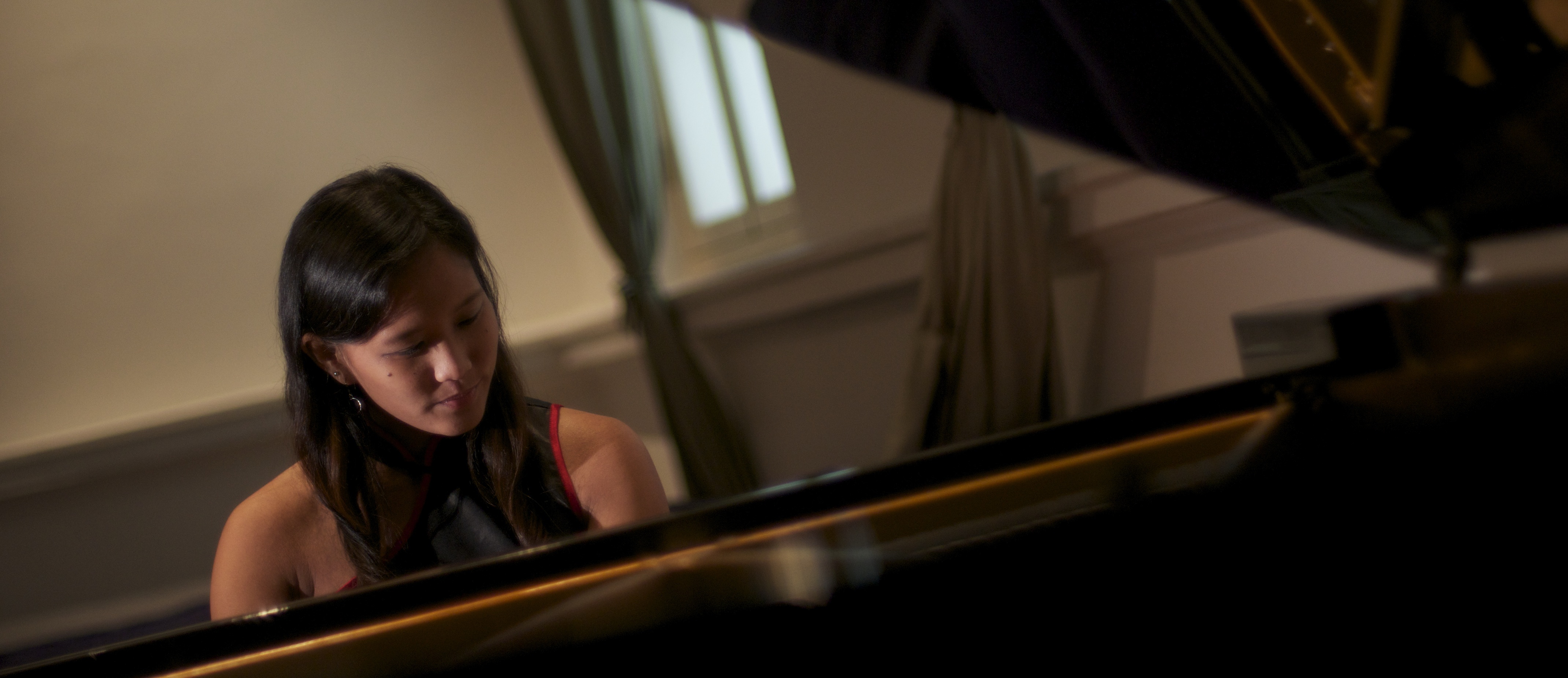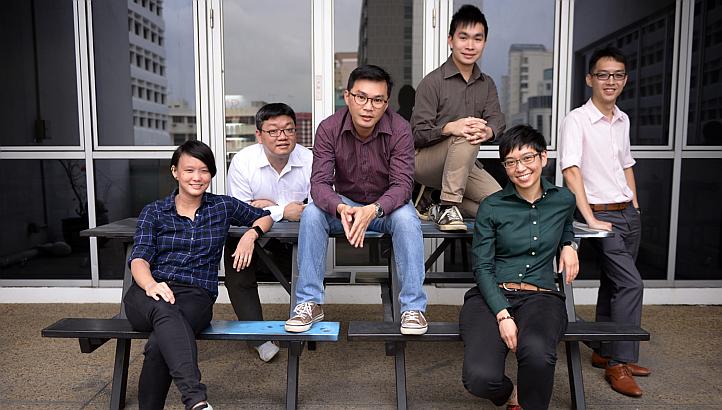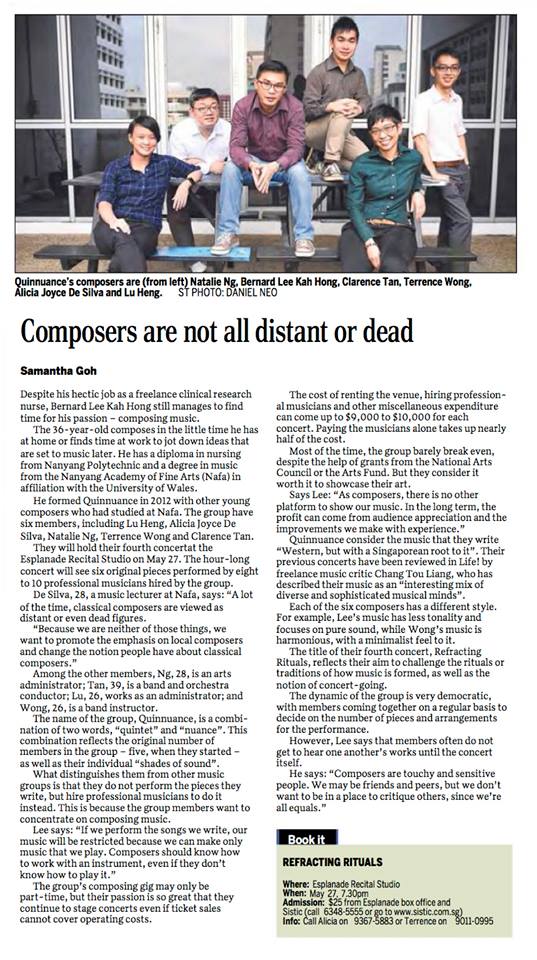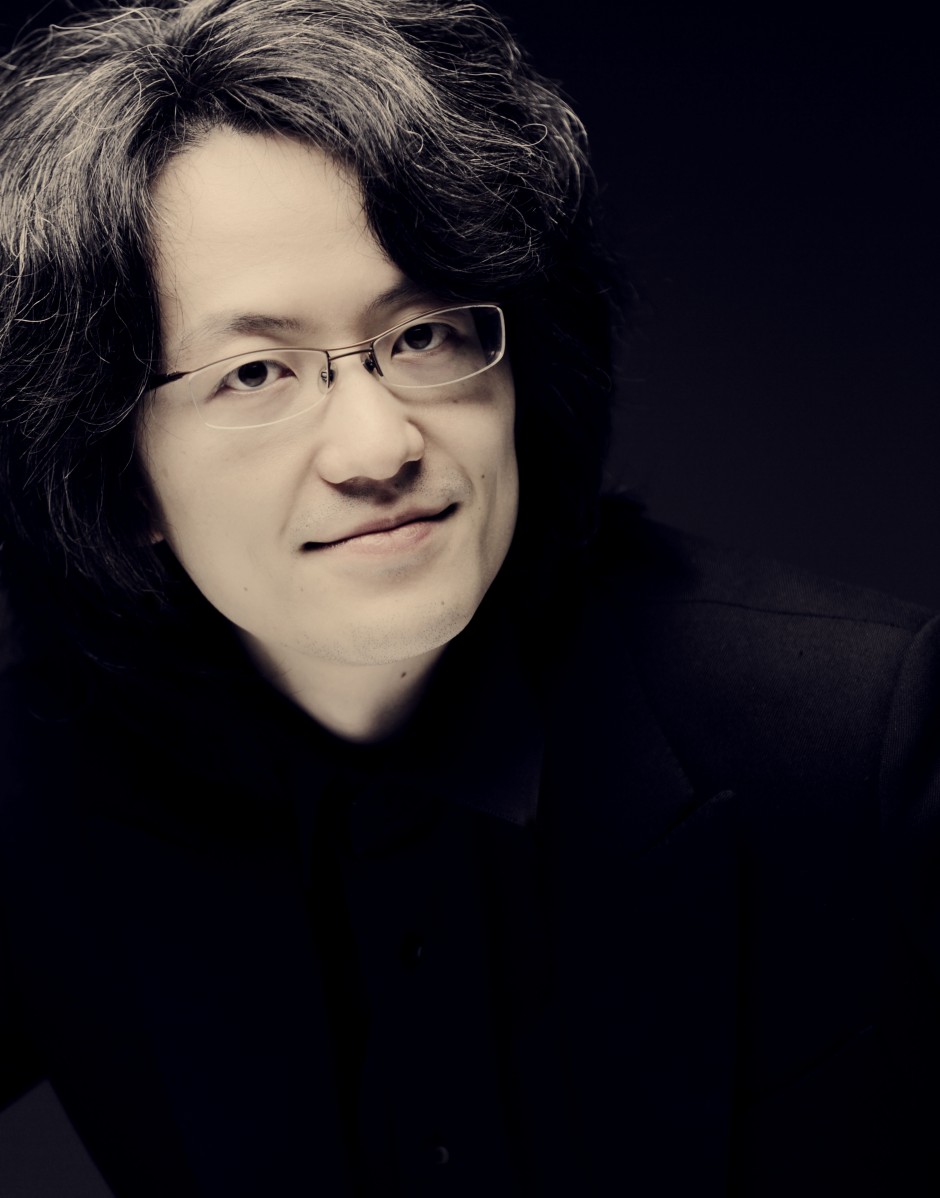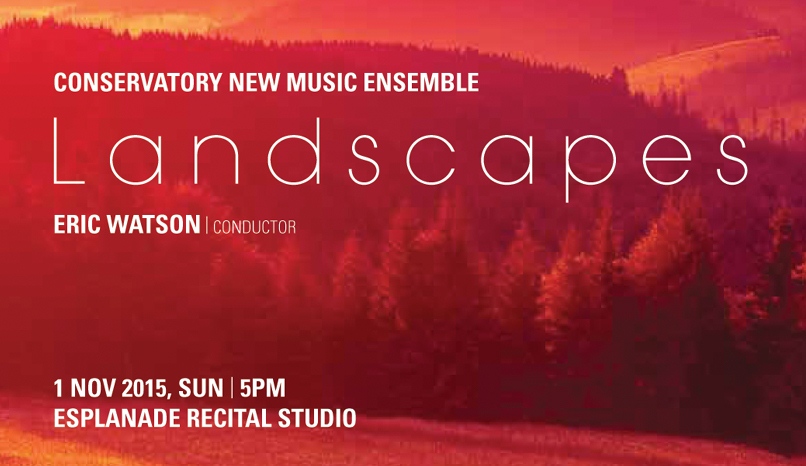
Eric Watson can order his Kopi C Kosong in fluent Singlish, writes music for Chinese, Indian and Malay ethnic instruments, and has lived here long enough to fit into the Singaporean landscape. Plink, Plonk, Plunk catches up with him ahead of the Spectrum concert he presents at the Esplanade Recital Studio where he programmed, composed, wrote programme notes, and conducts the YST Conservatory New Music Ensemble.

1/You chose the programme, wrote the programme notes, wrote a piece and will be conducting this concert. Could you tell us what you had in mind when putting the programme together?
There were actually two ideas I had in mind: one was that alternate points of view, when we encounter them, can actually be sometimes quite startling – I’m not talking about someone else’s point of view, but your own point of view – it’s like when you see a tree from a different angle, sometimes it seems like it’s a completely different tree but it’s not, it’s the same tree. It’s a totally different angle, perhaps the light is different, or even the sound is different – there are birds on one side and not on the other – so that sort of alternative point of view has always fascinated me. Also, the same stories that could have different endings, I find that quite fascinating. It was partly with the tree analogy in mind that I called [the concert] Landscapes.
The other thing I had in mind was that I wanted to feature some music that came from the group of composers that were active after the Cultural Revolution: Zhou Long, Chen Yi, Bright Sheng.. That’s why those two pieces came to be there. Again, partly because they’d been in isolation during the Cultural Revolution, for me that was an interesting perspective to see what might actually come out of that.
2/ let’s talk about your piece Inner Landscapes : it deals with changes in perspective. Could you tell us a bit more about how you wrote it and what you had in mind when writing it?
Well Inner Landscapes is the inner landscapes of the mind, in this particular case. I’ve spoken to many people about how they think, what they think, and it’s interesting just because of how different those processes can be. Some people do actually think linearly, but I think majority of people think in a sometimes disjointed, rather haphazard manner on the surface – it’s not necessarily unconnected because I think there are subconscious forces at work – and that process has also always fascinated me, it’s like the ‘stream of consciousness’ idea that you encounter during James Joyce’s Ulysses, for instance. The whole last part of the book is basically a stream of consciousness of ideas floating through the surface, disappearing, and then coming back in another form, perhaps something else, certainly transmuted.
The analogy I can give with Inner Landscapes is that in the opening fanfare, a typical, ritualistic fanfare in a sense, becomes by the end of the piece, a rhythmic pulse in the background of what else is happening. And ten minutes later that’s the link between the ending and the beginning.
But when I set out to write it, I didn’t know that it was going to happen. Over the period of the piece, the fanfare began to transform itself, and at one point, the composition started to have a life of its own. This happens to me most of the times in writing, and I look forward to that point because then, I get nice surprises, sometimes not so nice surprises… A lot of the time it picks up a life of its own and for me, it’s become a kind of living thing in itself…
..so then it’s kind of like Franz Liszt’s thematic transformations where something becomes something else?
Well yeah, that’s right. And sometimes it’s very difficult to see where the end result actually came from; but I’ve done this enough times and studied enough composers’ works to realise that this is very much a part of the creative process.
3/Speaking of perceptions, have you changed your perceptions on life and music as you grew up?
Yes I hope I’ve changed my perceptions as I’ve grown up a bit!
Actually yes. When I was a student, for instance, I was listening to a lot of what was called avant-garde music. It still is avant-garde music now, but it tends to refer to that particular period of time then. I was listening to composers and talking to them, like Stockhausen, and going to concerts, and there was an awful lot of new music I was actually hearing.
But gradually over a period of time, my ideas of what I was listening to, and what I was enjoying as a listener began to change. After some years I looked back (I actually stopped composing for a while, because it brought me to a halt, I couldn’t sort of feel where I was), and actually then, some years later, I thought to myself one day that the process that goes on exists in several different ways – perceptions again!
You often have the professional observers – critics, the historians and musicologists – making predictions saying, ‘this should be this way, and that should be that way’, I look back and I think, not much of that has actually happened in the way that it was expected to be. And of course I began to understand that there were forces – subterranean forces, if you like (sounds a bit sinister, doesn’t it) – that work that, composers, creative artists, just simply have their own creativity that compels a direction different from what could be expected. But I’ve learnt to be comfortable about it in the end, rather than sit up and think, ‘oh, I shouldn’t be doing it this way, because this is not the right type of music that 21st century composers should be listening to’, and I’ve heard this attitude before several times. But now I’ve gotten quite comfortable with it and my music shows it, probably to a very large extent.
In the end, I wanted to communicate – I didn’t want to just have a small band of followers whom my music spoke to and nobody else – so that was an important part of my creative process.
4/And how have your perceptions changed also since moving to Singapore from UK?
When I came to Singapore, what I discovered was – it sounds strange, but – an iceberg. What I mean by that was that I’d started exploring a little bit of gamelan music when I was in the UK and a little bit of music coming of other cultures. Not a lot, but enough to get intrigued.
When I came to Singapore, that was when I discovered the rest of the iceberg, because you know that the tip of the iceberg is usually one-fifth of what you actually see, whereas the rest is huge and there and quite dangerous, and you don’t see it. That’s what happened with Singapore. It’s all there, and I’ve discovered it and it’s dangerous because it’s made me really think outside the perimeters we’re used to.
Now I’ve encountered gamelan in a very whole-hearted fashion, but also Indian music, and Chinese music, various kinds, and I don’t necessarily mean only the orchestral music which goes back only to the last 100 years, but I’m talking also about Nanyin music which goes back such a long time. The tradition of small ensembles as well – chamber music-making – particularly in Chinese music but also Indian music and other areas too. So that’s what Singapore has done, it’s opened all that up to me. But whether in the end I’m successful or not, in those directions, I guess time will tell.
5/ You have won some awards so time has told something – you’ve been quite successful in mixing the instruments of Indian, Chinese and Malay music.. but I wonder about jazz. You used to play jazz piano..
Yes, it’s true. For a long time I earned my living working in musical theatres as conductors and director. And of course I’d encounter all kinds of musicals, literally from the Sound of Music to Jesus Christ Superstar, those are two extremes. And of course there’s a great variety of styles of music within all of that.
So that inevitably has become a part of what I am, because I actually quite a lot of things – I really do like theatre music, you know, it’s still for me, an excitement: I go to a musical and hear the orchestra start up and I get all excited, it’s like a little boy in a sweet shop!
6/ what inspires you besides theatre music and the new fangled instruments that you’ve learnt about?
So many things, really. Natural phenomenon, in the sense of landscape for instance, like the sky… I’ve just written a piece called Constellations inspired by, literally, constellations.. so all that kind of natural phenomena inspires me. But sometimes, just walking along a road it can be the edge of a corner of a building, and I think, my word, that is really quite nice, or sometimes quite ugly too! I forgot which city it was – I’m not going to malign anybody here but I’ll say it wasn’t Singapore – I was in some city and I saw some kind of institute of architects’ building, and it struck me as the ugliest building I’ve ever seen in my life! It was literally a square box! and I thought, ‘what are they doing, these architects?!’
So lots of things inspire me. Literature does, certainly. But whatever it is that inspires me, at some point, has got to engender some kind of emotion within me. quite often it’s simply wonder at first, but emotion is a communicator, not just to communicate to others but quite often, to communicate to ourselves.
Music, if it doesn’t communicate, for me then really lives in an ivory tower. And I don’t like it.
Many things inspire me but normally whatever it is, art, photography, literature, nature or just ‘doodling’ stirs something in me emotionally, not necessarily in a pleasant or ‘romantic’ manner after all disgust is also a strong emotion, but whatever it is it gets me thinking and feeling.
7/ if you had to describe your music in less than 10 words, what would it be?
Eclectic is probably the best way. I do actually sometimes change styles and feel in pieces that I’m going about.. but it’s not inconsistent.
Also my music tends to be, in new music terms, reasonably approachable to people on the whole. Not always, because sometimes I do get times where I start thinking to myself, ‘I can’t express this in any way except in a way that it’s difficult to listen to; because that’s what it is about. but for the most part, I do try to write things that people could understand at some level. And I don’t think that’s writing down, that’s not what I want to do at all. It’s the same when I’m using ethnic instruments as well – I don’t try to write Chinese music or gamelan music using the instruments.. I use that sound world as a resource and try to write my music. I don’t want to imitate other things because other people do it far better anyway.
Sorry that was far longer than 10 words wasn’t it?
8/Finally, one last question – Why should people come to this concert?
Well because it’s an enjoyable experience. They might find the contrast themselves quite interesting and amazing, and perhaps will just get some insight on an area which is perhaps not quite as well known as it should be.
And actually this is music of our day, you know, there‘s an awful lot of music that doesn’t belong to our century – we play it a lot and it’s very magnificent and all – but this is music that comes from the world that we are living in, at this time. So I think it’s an important for that reason.
Landscapes by Eric Watson and the YST Conservatory New Music Ensemble happens this Sunday, 1 Nov 2015 at the Esplanade Recital Studio. Come and witness the breath-taking, ever-shifting landscapes in music! Buy your tickets here now!
Landscapes is part of Spectrum, an Esplanade Presents programme.
